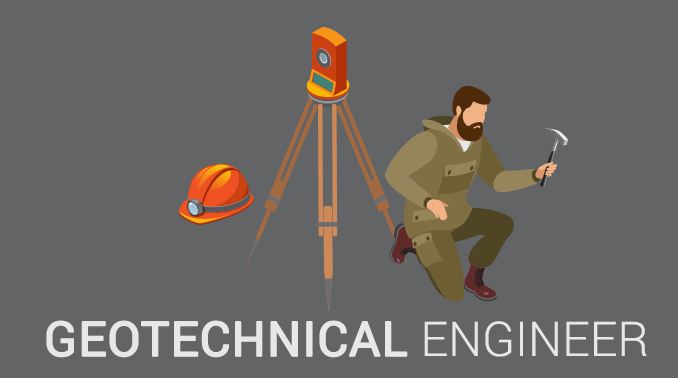The 8-Minute Rule for Geotheta
The 8-Minute Rule for Geotheta
Blog Article
Geotheta Things To Know Before You Get This
Table of ContentsThe 5-Second Trick For GeothetaSome Known Factual Statements About Geotheta The Definitive Guide for GeothetaThe Definitive Guide for GeothetaGetting My Geotheta To Work

They carry out website investigations, accumulate examples, carry out laboratory tests, and analyze data to evaluate the viability of the ground for building and construction tasks - Geo Tech Engineering. Based on their searchings for, geotechnical engineers offer recommendations for foundation style, slope security, retaining frameworks, and mitigation of geotechnical threats. They work together with other specialists, such as architects, structural engineers, and building and construction teams, to make sure that geotechnical considerations are integrated right into the overall job style and application
By examining the actions and properties of dirt and rock, they can recognize prospective geotechnical dangers such as landslides, soil negotiation, or slope instability. Their experience assists avoid failures or mishaps that could threaten lives and residential property. Right here are some comprehensive duties and duties of a geotechnical designer: Site Investigation: Geotechnical designers conduct site investigations to collect information on subsurface problems.
They translate the data to recognize the homes and behavior of the soil and rock, including their toughness, leaks in the structure, compaction characteristics, and groundwater conditions. Geotechnical Analysis and Style: Geotechnical designers assess the data gathered throughout website investigations to analyze the security and suitability of the website for construction projects. They carry out geotechnical calculations and modeling to evaluate variables such as birthing capability, settlement, incline security, side planet pressures, and groundwater circulation.
Indicators on Geotheta You Need To Know
Foundation Design: Geotechnical designers play a critical function in designing structures that can securely support the designated framework. They evaluate the dirt conditions and load needs to establish the proper structure type, such as superficial foundations (e.g., footings), deep foundations (e.g (https://issuu.com/geotheta)., piles), or specialized methods like dirt improvement. They take into consideration elements such as negotiation limitations, birthing capacity, and soil-structure interaction to develop optimum structure layouts
They assess building and construction strategies, display site activities, and carry out field examinations to confirm that the style suggestions are complied with. If unexpected geotechnical issues develop, they examine the scenario and provide suggestions for removal or modifications to the style. Threat Assessment and Reduction: Geotechnical engineers evaluate geotechnical threats and risks connected with the project site, such as landslides, liquefaction, or soil disintegration.

Collaboration and Interaction: Geotechnical engineers function carefully with other specialists associated with a project, such as engineers, structural designers, and construction teams. Effective interaction and cooperation are necessary to incorporate geotechnical factors to consider right into the general task design and building and construction process. Geotechnical engineers offer technological proficiency, answer questions, and make sure that geotechnical requirements are satisfied.
Geotheta for Beginners
Right here are some kinds of geotechnical designers: Structure Engineer: Structure engineers focus on creating and evaluating foundations for frameworks. They assess the dirt problems, lots needs, and website qualities to figure out the most ideal structure type and style, such as superficial structures, deep structures, or specialized methods like stack foundations.
They review the variables influencing slope stability, such as soil properties, groundwater conditions, and incline geometry, and establish methods to stop incline failings and minimize risks. Quake Designer: Quake engineers focus on assessing and developing structures to stand up to seismic forces. They evaluate the seismic risk of a website, examine soil liquefaction potential, and develop seismic style criteria to make sure the safety and security and resilience of structures during earthquakes.
They perform area screening, gather samples, and analyze the accumulated data to define the dirt homes, geologic developments, and groundwater conditions at a site. Geotechnical Instrumentation Designer: Geotechnical instrumentation engineers focus on tracking and gauging the behavior of soil, rock, and structures. They install and preserve instrumentation systems that monitor aspects such as dirt negotiation, groundwater levels, incline motions, and architectural variations to examine efficiency and provide early cautions of potential concerns.
Geotheta for Dummies
They carry out examinations such as triaxial examinations, consolidation examinations, straight shear examinations, and leaks in the structure examinations to collect information for geotechnical analysis and style. Geosynthetics Designer: Geosynthetics engineers focus on the style and application of geosynthetic products, such as geotextiles, geogrids, and geomembranes. They use these materials to boost soil stability, strengthen inclines, give drainage options, and control disintegration.
They tend to be investigatory people, which indicates they're intellectual, introspective, and curious. They are curious, methodical, sensible, logical, and logical. Some of them are also social, indicating they're kind, generous, participating, person, caring, valuable, compassionate, sensible, and pleasant - Tailings Engineer.
In the office environment, geotechnical designers utilize specialized software tools to execute calculations, produce designs, and assess information. They prepare reports, testimonial task specifications, communicate with customers and staff member, and coordinate task activities. The workplace setup provides a helpful setting for study, analysis, and collaboration with other specialists entailed in the job.
The Buzz on Geotheta
They frequently go to task sites to perform website examinations, assess geotechnical conditions, and collect data for analysis. These check outs involve traveling to various places, occasionally in remote or difficult terrains. Geotechnical designers might carry out soil sampling, conduct tests, and screen building activities to guarantee that the geotechnical aspects of the task are being applied properly.
Geotechnical engineers additionally work in specialized geotechnical laboratories. Geotechnical research laboratory engineers work extensively in these environments, dealing with testing equipment, running instruments, and recording data.
Report this page